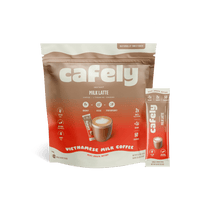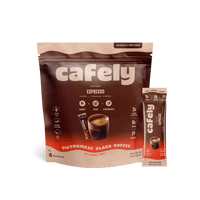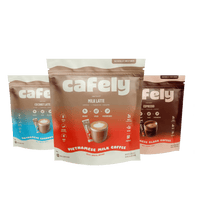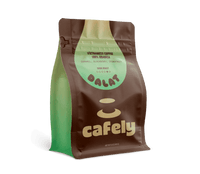Are coffee stains dimming your smile? Do you love your morning cup of coffee but don’t love the yellow tinge on your teeth afterward?
The good news is that you don't have to choose between coffee and a bright white smile.
There are plenty of ways you can enjoy coffee and have pearly white teeth at the same time.
Let’s dive in and discover practical and easy methods to restore your teeth's natural whiteness without giving up your favorite brew.
1. Brush Your Teeth Twice/Day

Oral hygiene is massively important and should be a part of everyone’s daily routine. This is especially true if you drink coffee every day and you’re concerned about stains.
Here are three basic things to prevent coffee stains:
- Brush twice daily with a whitening toothpaste that contains a mild abrasive like baking soda.
- Floss daily to remove particles that could lead to staining.
- Use mouthwash to reach areas that brushing and flossing might miss.
Although these seem like common sense remedies, you’d be amazed at how many people forget to floss or don’t use mouthwash after they brush their teeth. Some even need reminding about proper dental care after having had a tooth out. They immediately resume drinking coffee after tooth extraction when they should have waited at least 48 hours.
These small parts of your dental routine add up to make a huge difference to your smile, especially regarding coffee stains.
2. Apple Cider Vinegar
Apple cider vinegar is a natural whitening agent that can help remove surface stains from your teeth. Dilute it with water and use it as a rinse once a day. The ideal dilution is around 2 parts water to 1 part apple cider vinegar.
Be sure not to overdo it, as the acidity of vinegar can weaken enamel if used excessively — doing this about once per week should be more than enough.
3. Baking Soda Rinse
Baking soda is another great tool for keeping your teeth bright and white.
Mix a teaspoon of baking soda with water to create a simple, effective rinse. This mild abrasive can help scrub away stains caused by coffee, as outlined in this guide to removing coffee stains, restoring your teeth's natural whiteness.
Use this method once or twice a week to avoid damaging your enamel.
4. Drink Coffee With a Straw
One simple way to reduce coffee stains is by drinking your coffee through a straw. This limits the direct contact between your teeth and the coffee, helping to minimize staining over time.
Opt for a reusable straw to keep things eco-friendly while protecting your teeth.
5. Rinse with Water After Drinking Coffee
Another easy trick is to rinse your mouth with water after drinking coffee. This helps wash away the staining compounds before they can set on your teeth. It’s a quick and effective way to reduce stains without altering your coffee-drinking routine.
6. Hydrogen Peroxide Whiteners
Some industry experts also recommend gargling hydrogen peroxide. Science backs this up as a great home remedy for teeth whitening [2].
Although you can buy hydrogen peroxide that's as potent as 35%, you should never use chemicals this strong to whiten your teeth. Hydrogen peroxide that's been diluted to 3% is best. When it comes to teeth whitening, less is more [3].
Only use prepared hydrogen-peroxide teeth whitening kits. These products already use the right concentration of hydrogen peroxide and include special teeth molds to keep the peroxide on your teeth and away from the rest of your mouth.
While hydrogen peroxide is safe for teeth whitening, you should never swallow it. It can cause damage to your organs and even cause internal bleeding. There’s also a good chance that you’ll start vomiting a foamy substance not long after ingesting it.
7. Professional Dental Treatments

If you’re not a fan of at-home remedies, there are several professional whitening treatments you can try instead.
The two most common professional whitening treatments are:
- Hydrogen peroxide gel
- Hydrogen peroxide and high-intensity light whitening
Hydrogen Peroxide Gel
Hydrogen peroxide gel is the most common form of teeth bleaching. It can be done entirely in your dentist's office or partially in your dentist's office and partially at home.
When you receive in-office gel whitening, your dentist will protect your gums with a guard and apply a high concentration of hydrogen peroxide gel to your teeth with a syringe. The gel is left on your teeth for 15-30 minutes before you rinse it off.
With in-office gel whitening, you'll have to return to your dentist for several short appointments until the process is complete.
High-Intensity Light Whitening
Combining hydrogen peroxide with high-intensity light helps you achieve results much faster. This process takes place within your dentist's office in a single sitting.
A high-concentration hydrogen peroxide gel is applied to your teeth before a high-intensity light (such as halogen, UV, or LED) is shined onto your teeth. The light helps enhance the effects of the peroxide, delivering faster and longer-lasting whitening results.
Which professional teeth whitening option is best depends on your personal circumstances.
The high-intensity light whitening process costs a lot more at the beginning, but you get results in a single sitting. The gel whitening option is initially less expensive, but you need multiple dentist visits, and you may also have to cover the cost of teeth impression and mouthguard.
How to Prevent Coffee Stains
One of the best ways to combat coffee stains is to prevent them in the first place. Not only can these solutions help you avoid developing coffee stains, but they can also help you prolong the effects of a teeth whitening procedure.
Best practices for preventing coffee stains:
- Drink coffee in one sitting instead of sipping throughout the day to minimize exposure.
- Use a straw to reduce direct contact with your teeth.
- Rinse your mouth with water after drinking coffee.
- Avoid coffee with sugar or syrups that can leave longer-lasting residues.
- Stick with short shots like espresso to minimize contact with teeth.
Related: How to Remove Coffee Stains From Clothes, Teeth, & Carpet
FAQs: Removing Coffee Stains from Teeth
We've covered the basics of removing coffee stains from teeth. Now, let's deep-dive a little further into the subject with some frequently asked questions.
1. How Often Should I Brush My Teeth if I Drink Coffee Daily?
If you drink coffee daily, you should brush your teeth at least twice a day and consider rinsing your mouth with water after each coffee.
2. Is Whitening Toothpaste Safe for Everyday Use?
Yes, whitening toothpastes are generally safe for everyday use. If you’re unsure about your whitening toothpaste, check to see if it's approved by the American Dental Association (ADA). If it is, then it's completely safe to use on a daily basis.
3. Can Natural Remedies Completely Remove Coffee Stains?
Natural remedies can help to reduce coffee stains, but they're unlikely to remove them altogether. Home remedies like baking soda can make surface stains less apparent but might not remove deeper discolorations completely.
If you're struggling with stubborn coffee stains on your teeth, visit your dentist for a professional whitening treatment.
4. How Effective are Professional Whitening Treatments?
Professional treatments are highly effective and can provide immediate results. If you choose hydrogen peroxide gel whitening, you can expect results in three to four weeks. The combination gel and LED whitening treatment gives you results straight away.
5. Is it Necessary to Use a Straw for Drinking Coffee?
It’s not necessary to use a straw for drinking coffee, but doing so can significantly reduce the amount of coffee that comes into contact with your teeth. This can lead to less staining. Whether or not you use a straw is a personal preference and depends on the style of coffee you drink.
6. What are the Risks of Home Whitening Methods?
Some of the risks of home whitening methods include the overuse of acidic or abrasive substances, which can erode enamel over time. Some products are not ADA-approved, which may damage your teeth rather than help them.
7. How Long Do the Effects of Professional Whitening Last?
The results of professional whitening can last anywhere from six months to two years. This is with proper care and attention, including using preventative methods after your treatment. The better you look after your teeth, the longer the results will last.
8. Can Changing My Coffee Habit Prevent Stains?
Yes, changing your coffee habit can prevent teeth stains. Reducing consumption and modifying how you drink coffee can help minimize staining.
You can use straws, drink your coffee in one sitting rather than sipping it, and rinse your mouth with water after you’ve finished your cup of joe. These methods have all been linked to minimizing coffee stains on your teeth.
9. Are There Any Foods That Help Prevent Coffee Stains?
Yes, some foods help prevent coffee stains. Raw fruits and vegetables (such as strawberries, lemons, carrots, and cauliflower) contain natural fibers that clean teeth by breaking down bacteria. For the best results, combine foods like these with proper oral hygiene and other preventative methods listed in this post.
10. What Should I Do If My Teeth Become Sensitive from Whitening Products?
If your teeth become sensitive from whitening products, consult your dentist. They can recommend special products designed for sensitive teeth or give you advice on how often you should be using the whitening product to reduce your sensitivity.
References
- Carey C. M. (2014). Tooth whitening: what we now know. The journal of evidence-based dental practice, 14 Suppl, 70–76.
- Jaime, I. M., França, F. M., Basting, R. T., Turssi, C. P., & Amaral, F. L. (2014). Efficacy of hydrogen-peroxide-based mouthwash in altering enamel color. American journal of dentistry, 27(1), 47–50.
- Bistey, T., Nagy, I. P., Simó, A., & Hegedus, C. (2007). In vitro FT-IR study of the effects of hydrogen peroxide on superficial tooth enamel. Journal of Dentistry, 35(4), 325–330.












